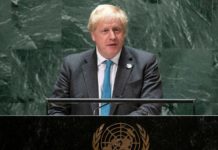Want to get The Morning by email? Here’s the sign-up.
Good morning. Hurricane Sally has made landfall. Europe is struggling with the coronavirus. And Trump hears an earful from voters.
President Trump doesn’t spend much time with voters who don’t already support him. As The Times’s Maggie Haberman puts it: “Trump, by only doing rallies and almost never doing town hall forums, has been insulated from the kind of voter interaction that usually help incumbents as they’re running. But he craves adulation and many of his aides enable it.”
Last night, though, the president traveled to Philadelphia for a town hall, broadcast by ABC, with voters who identified themselves as undecided. And he heard an earful.
The first question came from a 2016 Trump voter who said he was trying to take the coronavirus seriously and had to avoid people who refused to wear masks: “Why did you throw vulnerable people like me under the bus?” the man, Paul Tubiana, asked.
Another voter, Julie Bard, asked why Trump didn’t support a national mask mandate. A third asked why he downplayed the virus. Others asked about racial injustice, Trump’s attempts to take away health insurance from people and his unpresidential behavior.
“I think this is by far the toughest grilling Trump has faced as president,” CNN’s Daniel Dale, who has covered Trump extensively as a fact checker, wrote.
Trump responded with a flurry of falsehoods to defend himself. (Here is a Times fact check.) He blamed Joe Biden for the lack of a national mask mandate. Trump also said, “A lot of people think the masks are not good.” At different points, he downplayed the virus and said that he had “up-played” it.
He claimed he was beloved by South Koreans. (His recent approval rating there was 17 percent.) He said all Americans owned stocks. (About half do.) And he said the late John McCain, a war hero who was known in the Senate as an advocate for veterans, didn’t do enough for veterans.
“This is a president who still hasn’t adjusted to the fact that 2020 is not the year he wanted it to be,” Amy Walter of the Cook Political Report wrote.
The Times’s Trip Gabriel tweeted: “When @JoeBiden debates Trump, he’ll be faced with what’s on display tonight: rapid fire falsehoods, free-ranging personal attacks, over the top claims of his achievements.”
On Fox News, Laura Ingraham described the event as an “ambush” by ABC.
In other campaign news:
-
Yesterday was arguably Biden’s best day of state polls since the Republican National Convention, according to Nate Cohn, a Times polling expert. And a new ABC News/Washington Post poll this morning showed Biden ahead by six percentage points in Wisconsin and 16 points in Minnesota. In 2016, both states were extremely close, and Trump won Wisconsin.
-
In the last state primary of 2020, Senator Chris Coons of Delaware, a Democrat, easily defeated a progressive challenger, Jessica Scarane.
TWO MORE BIG STORIES
1. Disasters with a common cause
More than five million acres have burned on the West Coast. Tens of thousands of people have fled their homes. And at least 27 are dead. More favorable weather in Oregon has allowed firefighters to make some progress, but the largest fires are still mostly uncontained.
Scientists say climate change — specifically warmer temperatures that dry out vegetation — is a major factor in the region’s worsening fires. Climate is also playing a role thousands of miles away on the Gulf Coast, where Hurricane Sally strengthened overnight and made landfall in Alabama this morning. Scientists believe that warmer temperatures make such storms both slower and capable of holding more moisture, which can make them more destructive.
2. Learning to live with the virus
Facing a possible second wave of coronavirus infections, European countries are trying to walk a tightrope: avoiding the harsh lockdowns of the spring, while also adhering to social-distancing rules and contact-tracing protocols.
“It’s not possible to stop the virus,” said Emmanuel André, a leading virologist in Belgium. “It’s about maintaining equilibrium. And we only have a few tools available to do that.”
-
The city of Louisville, Ky., agreed to pay the family of Breonna Taylor $12 million and institute police reforms, six months after officers fatally shot the 26-year-old Black woman in her apartment.
-
Officials in Rochester, N.Y., spent months trying to suppress video footage of the police encounter that led to Daniel Prude’s death.
-
A “horrific culmination” of engineering flaws, mismanagement and a lack of federal oversight led to two fatal crashes involving Boeing’s 737 Max jet that killed 346 people, House Democrats said in a report.
-
In a diplomatic victory for the Trump administration, the U.A.E., Bahrain and Israel formally signed a deal normalizing relations among the three countries.
-
The Justice Department has opened a criminal investigation into whether John Bolton, Trump’s former national security adviser, disclosed classified information in a tell-all memoir about his time in the administration.
-
Bill Gates Sr. — the father of the Microsoft co-founder and a key figure in shaping the family’s philanthropy — died at 94.
-
Lives Lived: When Dr. Marion Moses wasn’t tending to the health of poor migrant laborers as a trusted aide to Cesar Chavez, she was out campaigning for their rights. On a trip to New York to drum up support for a nationwide consumer grape boycott, she recruited Gloria Steinem, Lauren Bacall and the folk trio Peter, Paul and Mary. Dr. Moses died at 84.
IDEA OF THE DAY: The end of seasons
The pandemic can make time feel blurry. The school year is starting, but millions of children aren’t returning to classrooms. Last week, for the first time, all of the four biggest U.S. pro sports leagues — baseball, basketball, football and hockey — played games on the same day. And who even knows what Halloween will look like.
Then there is climate change, which is responsible for a global “season creep.” Frosts come earlier, first snows fall later. Hurricanes stretch out on both sides of the calendar. And, frighteningly enough, fire season is just getting started in the American West. As Paul Elie writes in The New Yorker, “The coronavirus pandemic, together with recurring natural phenomena brought on by climate change, is sharply altering our sense of the seasons.”
How to cope? (Beside, perhaps, looking for ways to combat climate change.) Quartz and Slate both suggested participating in phenology, or the close study of nature’s rhythms. Keep a journal in which you track how the seasons are changing around you. “In so doing, you can anchor yourself in place and be a witness to the way nature is actually responding to change, instead of dwelling on the disasters that might come,” Rebecca Onion wrote for Slate.
PLAY, WATCH, EAT, CUBE
An ode to tacos
Vegetarian and vegan taco fillings aren’t new: You can trace their lineage back through Indigenous cuisines. This past spring, many taqueros in Los Angeles turned to making meatless tacos when the pandemic prompted ingredient shortages and drastic price fluctuations.
There are about 43 quintillion ways to arrange a Rubik’s Cube, but only one that is correct. Since a Hungarian architecture professor named Erno Rubik invented the cube in 1974, more than 350 million cubes have been sold globally.
Rubik, 76, often speaks about his invention as if it were his child. “I’m very close to the cube. The cube was growing up next to me and right now, it’s middle-aged, so I know a lot about it,” he said in a new interview.
Diversions
Games
Here’s today’s Mini Crossword, and a clue: Number of teaspoons in a tablespoon (five letters).
You can find all of our puzzles here.
Thanks for spending part of your morning with The Times. See you tomorrow. — David
P.S. The Twitter bot @nythaikus scans every Times article looking for a sentence with the right configuration of syllables. An entry yesterday: “Below, two people / rummaged by a hole where / a home used to be.”
You can see today’s print front page here.
Today’s episode of “The Daily” is about coronavirus quarantines on college campuses.
Source : Nytimes













